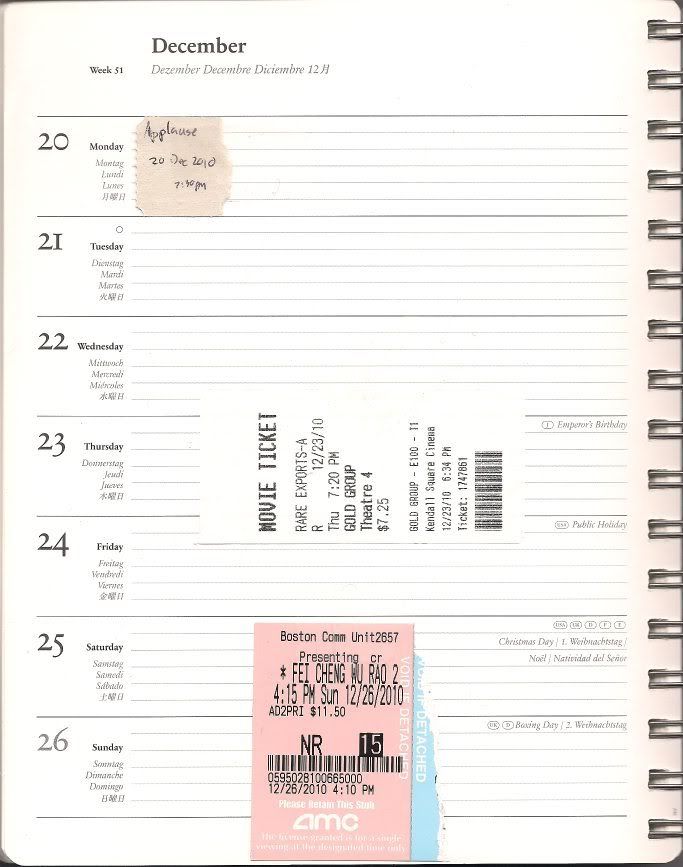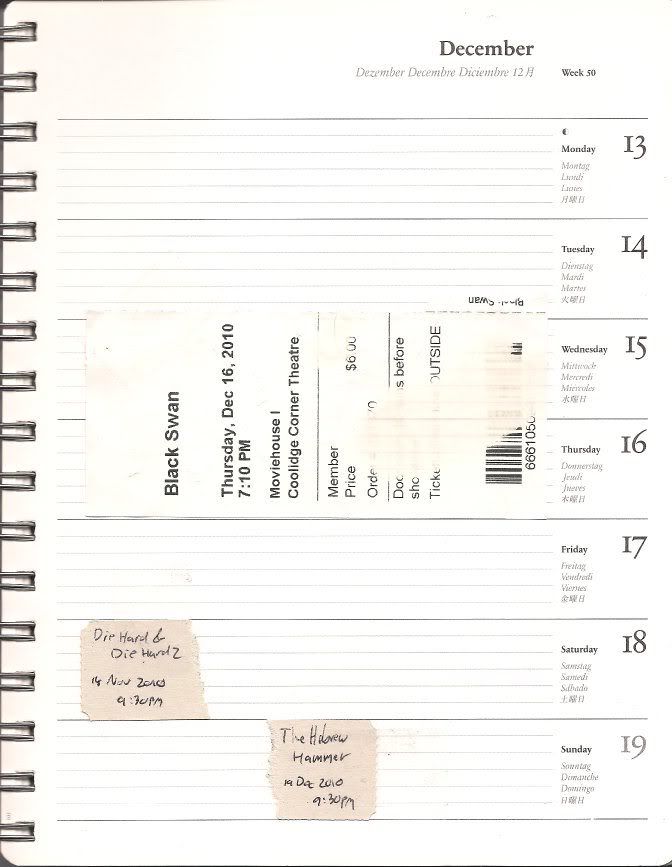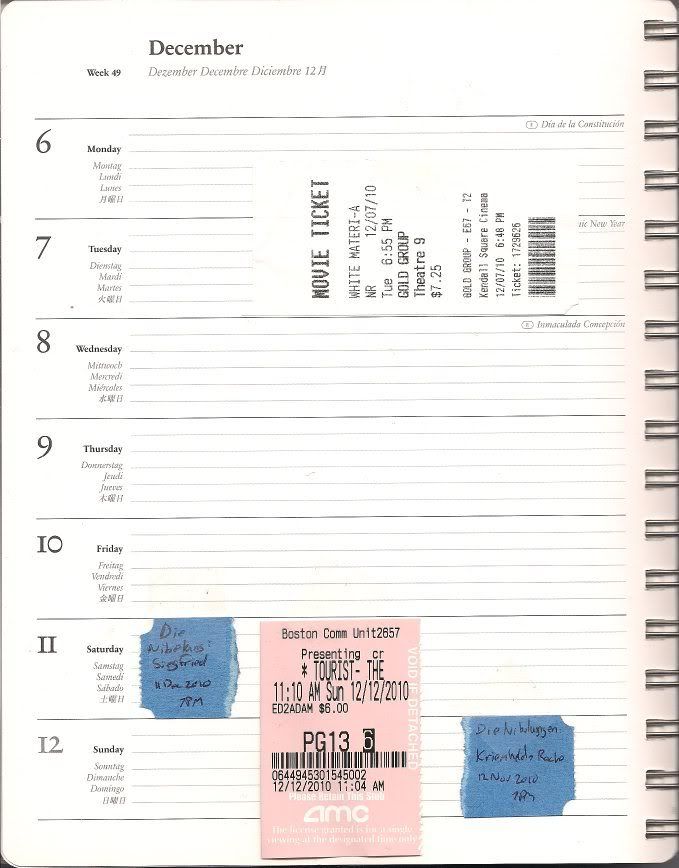One might think that
Tron would be a big deal for me - I was eight years old when it came out and as obsessed with computers as I now am with movies. This was a movie that was more or less made for elementary-school me, and you'd think that I'd be one of the fans who saw the twenty-eight-years later sequel come out and said "it's about time!"
Strangely, I'm not. I remember watching it on TV but not in a theater, and its details did not stick in my memory. Maybe I never saw it there - when you're eight years old and live in North Yarmouth, Maine, you see movies at your parents' pleasure. Still, you'd think that I would have seen the movie on its initial release, because I remember my dad liking it. And that's kind of a big deal - my parents, like most people, tended to see a couple movies in theaters every year and basically enjoy the evening out. Nowadays, Dad and his wife have a Netflix account that gets the standard amount of turnover, and he'll occasionally mention whatever the last movie he saw on it was. He's not a big movie fan.
But, I remember him talking about
Tron. And when I was up in Maine for a couple days for Christmas,
Tron Legacy was the movie he asked if I'd seen. I hadn't, but mentioned I would use this "floating holiday" to do so. Sorry I can't say it's a better movie.
(I'll have a few observations that reference the end of the movie after the eFilmCritic excerpt, two horizontal lines down.)
Also: I didn't realize that I was actually going to use the entire day to do it. But, the bus to Reading dropped me off at 1pm for a 2pm show (there was another one, but it would be very close to the start time even without padding for delays as one does the day after a blizzard). I thought an inbound bus was coming when the movie got out rather than an outbound one (the 136/137 routes make a circle, so it makes sense to take the outbound 137 and then stay on it as it becomes an inbound 136 to get back home), and wound up on the wrong side of the road as it passed me. So, to see a two hour movie at two in the afternoon, I left the house at 11:30am and got back at 7:30pm. Yeah, Jordan's has the best set-up for this kind of movie, but it didn't really turn out to be worth it in this case.
I will admit, though, that I initially thought it had some especially awesome surround sound and 3-D effects going on - right as Sam Flynn is breaking into Encom tower, there were flashing lights and alarms going off all over the place. Cool, until the movie stops and we're directed to exit to the parking lot. Then it's just cold (and, yes, I'm mentally tracking how likely it is that each minute we spend out there is a minute shrinking from my window between the end of the movie and when the bus arrives).
Tron: Legacy* * (out of four)
Seen 28 December 2010 at Jordan's Furniture Reading (first-run)
Tron: Legacy would dearly like to be the
Star Wars prequels. That's not the nasty insult from me that it might be from others - I liked the new
Star Wars movies. It's trying to do the same thing - return to a world last seen a generation ago, pretty it up with new effects, and throw some philosophy in there (and, yes, sell a bunch of merchandise and keep the property going in other media long after it leaves theaters). It just doesn't do so nearly as well.
Twenty years ago, Kevin Flynn (Jeff Bridges) disappeared, leaving a young son and his company Encom behind. Now, Sam Flynn (Garrett Hedlund) is the majority shareholder of Encom, but is more likely to pirate its new operating system release before its launch than actually attend board meetings. The day after one such escapade, Kevin's old friend Alan Bradley (Bruce Boxleitner) mentions he's received a page from the old arcade, and when Sam goes to investigate, he's zapped into "The Grid" just as his father was back in 1982. Now, though, it's a dystopia which CLU, a program modeled on Flynn and designed to create a perfect world (played by a digitally de-aged Bridges), rules with an iron fist, and now he'd like to get out an impose order on our world. Fortunately, a "program" by the name of Quorra (Olivia Wilde) rescues Sam and reunites him with his father, and they must race CLU to the exit portal.
Tron Legacy aims to be a chapter in a sci-fi epic, and is perfectly watchable as the first chapter (it has to be - Disney has made the original
Tron hard to find, fearing its dated effects and other weaknesses would hurt this movie's box office); it contains enough information to get the audience up to speed.
Just enough, perhaps; there are some scenes where this viewer who hasn't seen the original in something like twenty years didn't know whether the movie was recapping or introducing new information, especially when not a lot was done with it in this movie - are these scenes something longtime fans expected to see, or set-up for sequels? Even with that attempt to build complexity, it's a rather thin world, glossy on the surface but lacking detail and heft.
Full review at EFC.
In case you missed it up top, I'm going to mention things you might not want to know before seeing the movie down here. Navigate away if you don't want any of that.
As I mentioned, it's been twenty-odd years since I've seen the original
Tron - I would have purchased a DVD if any had been available in 2010, but Disney is apparently embarrassed of the movie it spent nine figures on a sequel to - so some of these questions are probably obvious to the big-time fans, but some things about it don't make a lot of sense. The impression of it that stuck in my mind was that it was sort of like
The Wizard of Oz - what went on inside the grid may have meen real, it may not have, but it didn't really matter, at least not until you start making sequels. Then it's real.
With that in mind... What
is "The Grid", anyway? Some sort of virtual-reality simulation? Unlikely, since we can't do that now, let alone run it on 1982-era computers (or, okay, 1989-era, as the Grid in the sequel is mentioned as being a new one). Has it been running for twenty years continuously? Who's been paying the power bill at Flynn's for that? If not, if it's some alternate dimension, that computer programs make some sort of impression on... Well, how sophisticated does a program have to be to do so? Does
10 PRINT "HELLO"
20 GOTO 10 do it? Am I killing a bunch of people when I purge my hard drive?
I mean, when CLU is rallying the troops against the Flynns in the end, he talks about the tyranny of the users, and from their perspective, he's kind of right about that. So when Tron breaks his brainwashing/repurposing in the end, saying his duty is to protect the users, isn't that kind of like the creepy moment in
Gone with the Wind when the slaves decide they were better off with their old masters?
What the heck are Sam, Kevin, and Quorra eating in their dinner scene? I mean, I know it's a pig, but do the programs have livestock? If so, what are they, lesser programs (maybe p-code or system utilities)? Does that go all the way down to plants and algae; is there an entire digital ecosystem in there? And do all programs need to eat, or is it just Users and Isos? Obviously they drink, because there needs to be a bar in which to have a fight, but that just seems silly, especially since when programs and isos are derezzed, there's not a bunch of blood and guts flying all over the place.
And finally, in terms of stuff about the set-up that just doesn't make sense to me, when Quorra exits the system in the end - just what sort of biology does she have in the physical world? After all, Sam appears to have a working simulation of a human circulatory system when he's on the grid - they can tell he's a user by the fact that he bleeds - so it stands to reason that Quorra is some sort of nano-constructed robot thing at the end.
Oh, and just in terms of "bad writing" - is James Frain's character supposed to be a traitor of some kind, with his toadying actually him trying to extract information to give to the resistence? That's what it seemed when he blurted something out before getting the failed-henchman bullet to the head, but if that's the case, they really needed to do better with that.
You may say all this is nitpicking, and you wouldn't necessarily be wrong, but I do tend to think that it goes to how, for all
Tron: Legacy's style, it has a lack of imagination. It doesn't really get into what a virtual society would be like. It doesn't have much in the way of commentary on the Flynns' conflicting philosophies (you want a really interesting story, have Kevin still thinking in terms of late 1980s business and architecture models, unable to see that Sam's twenty-first century distributed, open-source thinking is the key to defeating CLU). The Grid is just a snazzy-looking environment to render action scenes on, and that seems like kind of a waste.


